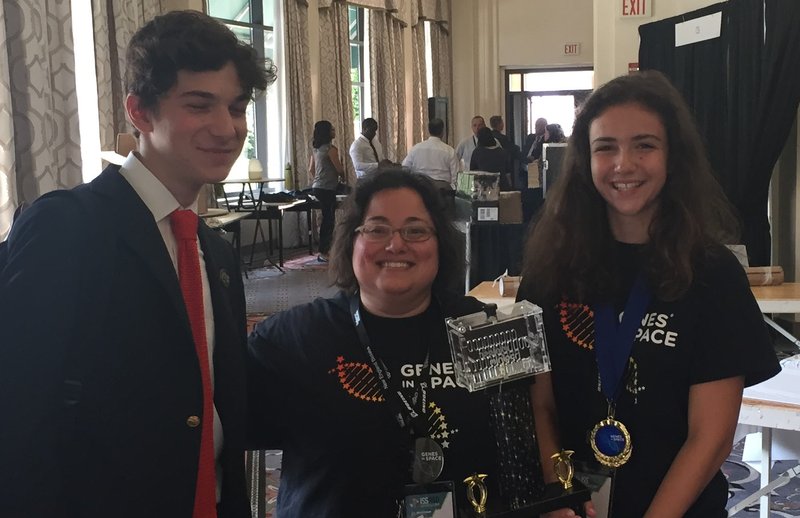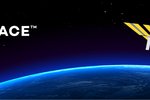GiS Spotlight: Educator Jessica Quenzer
All Genes in Space applicants are required to have an adult sponsor. While this adult may be a parent or other science enthusiast, more often than not students choose to have their teacher sponsor their application. Stuyvesant High School biology teacher Ms. Jessica Quenzer has taken the role of the adult sponsor to a whole new level. She has supported dozens of applicants since the early days of the Genes in Space contest. Her mentees include 2020 winner, Kristoff Misquitta as well as several other previous winners. Here, Ms. Quenzer shares her approach to mentoring Genes in Space applicants as well as the grading rubric she uses in her classroom.
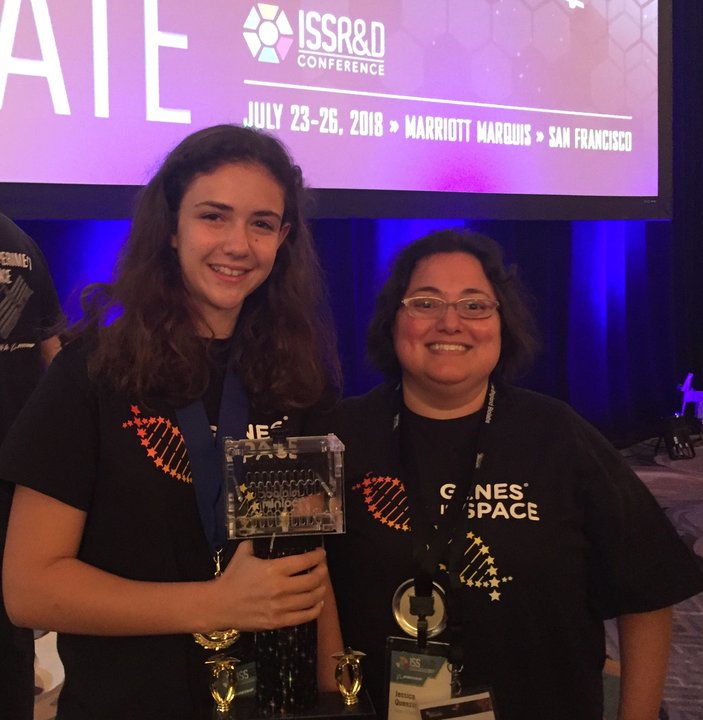 Ms. Jessica Quenzer with her mentee and 2017 winner, Liza Reizis
Ms. Jessica Quenzer with her mentee and 2017 winner, Liza Reizis
Describe your teaching background.
I started teaching high school in 2007, via the NYC Teaching Fellows Program. This was a career shift for me since previously I was a laboratory research associate. My background is in biomedical engineering, and my prior teaching experience was as TA for undergraduate biology labs. Since 2011, I've been teaching Biology at Stuyvesant HS in NYC. Stuyvesant is a specialized school that offers research electives and opportunities as early as freshman year. My courses include Freshman Biology Research, AP Biology, and a lab elective for upperclassmen.
What motivated you to get involved with Genes in Space?
I first heard about the Genes in Space competition through Math for America. The timing of it fit perfectly within the curriculum of my freshman biology classes - we cover molecular biology during the spring, just in time for the April deadline. I use the competition as a major end of unit assignment. My students are asked to write a complete draft for the assignment, and those who want to enter the contest then workshop the draft with me. I like how the students learn so much from the process, expanding upon what is covered in the curriculum. This shows their understanding and thinking better than an exam. I also like how the contest is low-stakes (it does not cost money or supplies to enter the competition) with a potentially huge, life-changing payoff for the students. Former students and students who were not enrolled in my classes are also welcome to workshop and enter the contest. As someone who used to perform PCRs on a daily basis with a thermal cycler too heavy to carry, I was thrilled to see that technology has progressed to portable equipment that can be sent to space. I'm even more thrilled to have a role in the ongoing space research!
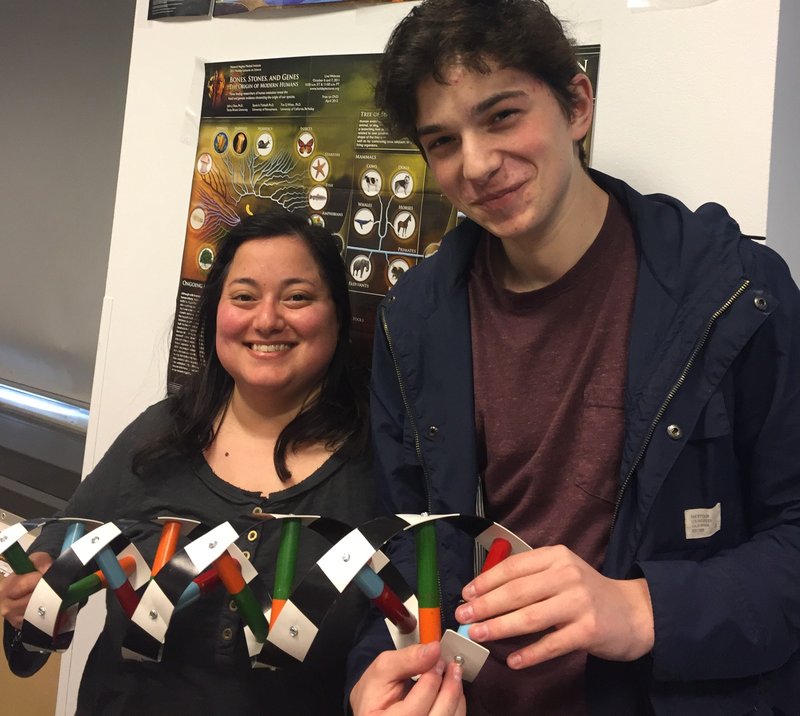
Ms. Quenzer with mentee and 2016 Genes in Space winner Julian Rubinfien
What advice would you give a student who's having a hard time coming up with a compelling GiS experiment?
A good start would be to read science news. Learn about what is currently going on in space science, and what has been published in scientific journals. Right now is an exciting time with the impetus to reach milestones with LEO and beyond. Think about what types of biological problems will be faced during extended stays in space, and you don't have to limit yourself to human problems.
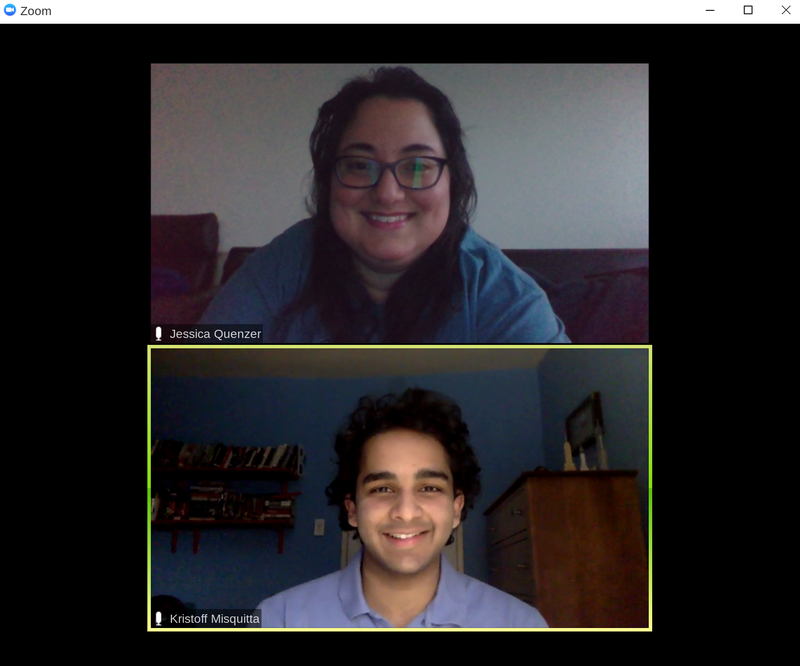
Ms. Quenzer and 2020 Genes in Space winner Kristoff Misquitta meet over Zoom
What tips would you offer a teacher who is sharing GiS with their class for the first time?
You and your students have nothing to lose by trying! Give yourself the time to read and provide feedback on drafts, and for students to make revisions. I tell my students that if they make it to finals, the experience will be like graduate school in miniature. They will have to defend their proposal like a thesis. Be prepared to support them.
What motivates your students to participate in Genes in Space year after year?
My students seem to be highly interested in Genes in Space because it allows them to think creatively and be actively part of current genuine research. Every entry is contributing to that think tank. Compared to other science competitions, it is much less intimidating to enter. Learning how to write a convincing proposal is a critical skill for someone considering a science career, so the contest is a great lesson for beginners. Submitting a proposal does not require finding a lab, completing benchwork, or accumulating enough data for a poster. It teaches them how to start, and can be a launchpad for future opportunities.
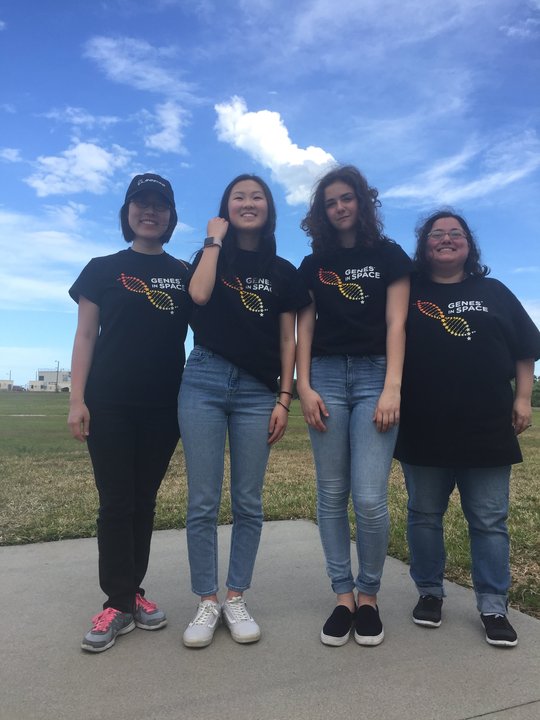 Ms. Quenzer at Kennedy Space Center to watch the 2017 winning experiments launch to space
Ms. Quenzer at Kennedy Space Center to watch the 2017 winning experiments launch to space
My students are further motivated to participate because they know that ranking in the Genes in Space competition is achievable. My first Genes in Space winner, Julian Rubinfien (2016), then a sophomore, showed them it could be done. My second, Liza Reizis (2017), proved that freshmen are capable of winning. My third, Kristoff Misquitta (2020), is a shining example of perseverance, that multiple attempts can eventually pay off. The honorable mentions benefit as well - besides reinforcement of a field they are already interested in, it affirms that their ideas are strong, and opens lab doors. Being able to demonstrate skilled proposal writing can help them find a lab internship later.
The significant time commitments don't happen until finals, and the finalists receive support along the way. The mentors from MIT and Harvard devote significant personal time leading up to the finals. This is a priceless opportunity for the students. I also enjoy interacting with these mentors, who are young PhD students and postdocs. They are brilliant and have already achieved so much! Deniz Atabay, Diana Cai, and Kathryn Malecek, the respective mentors for my students were wonderful. When I attended the events leading up to the launches of Julian and Liza's experiment, I was able to meet more mentors, including John Hatch, Kiana Mohajeri, and Holly Christensen. I was so impressed by their clarity of thinking, enthusiasm, and how much they cared for their mentees. I congratulate them and thank these fantastic mentors - this is what we want the science community to be like.
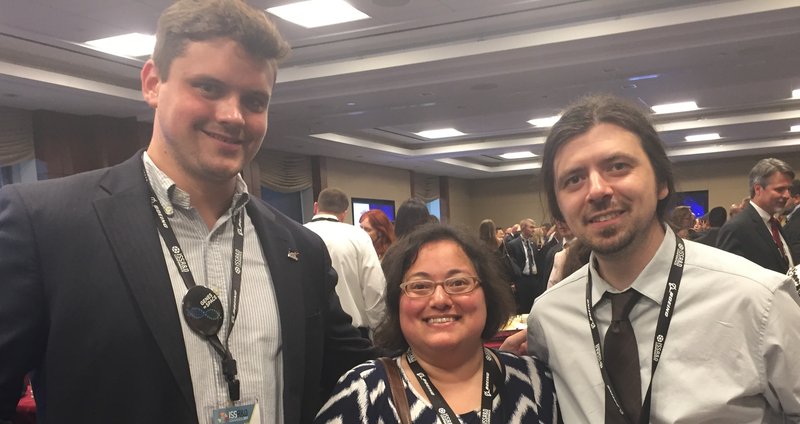
Ms. Quenzer with mentors John Hatch and Deniz Atabay
For myself, I am so happy and grateful to have attended the ISS R&D Conference, the finals, the pre-launch events, and of course the launches themselves. To say they were quite memorable is an understatement. Seeing how much science has advanced so quickly since I worked in the lab moved me to tears. Listening to current researchers discuss their findings, and to view works in progress was incredible. It is especially gratifying to see that some of that early-stage work was successfully launched this year! It has been such a positive experience for me.
